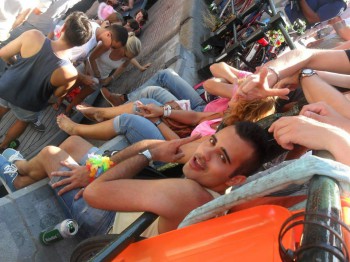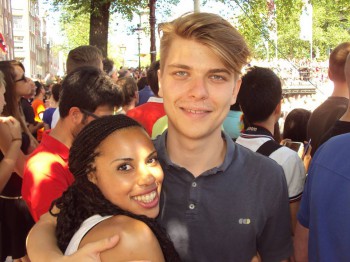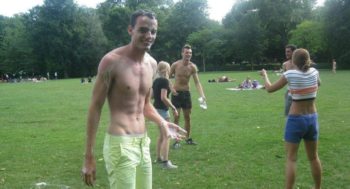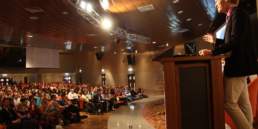AEGEE has been advocating social inclusion since its foundation. The biggest antenna of the network, AEGEE-Amsterdam, put this topic right at the heart of this year’s very successful Summer University, which took place from 25th of July till 5th of August. Under the headline “Expand Your Boundaries” one of the focus areas were lesbian, gay, bisexual and transgender (LGBT) rights. Gijs van Amerongen, European Affairs officer of AEGEE-Amsterdam, and Fleur, coordinator of this year’s Summer University, wrote this article especially for the Golden Times.
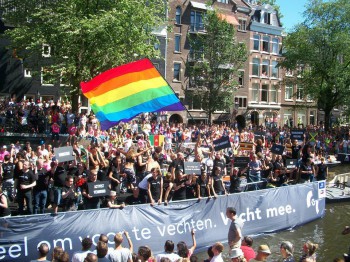
“With the annual gay pride in August in their mind, the Summer University Committee of AEGEE-Amsterdam started brainstorming on the theme of this year’s SU. With a lot of news items around the gay marriage in Europe this year we started to think that LGBT rights could be a great main topic to use. For the people who weren’t in our SU, the abbreviation LGBT stands for; Lesbian, Gay, Bisexual, Transgender. Coming from the Netherlands, we Dutch people are used to a total different level of tolerance. We thought it would be interesting to compare the Dutch situation with other European countries.
But not only LGBT rights were covered in our programme. Our goal in Expand Your Boundaries was to get our participants out of their comfort zone and let them to try new things. As most of our participants were very young, with an average age of 20, there were a lot of new things to experience for them. For many it was there first time travelling without parents. Hitchhiking, seeing the red light district, experience a coffee shop, going to a gay bar, a drugs course and the paperclip game were some of the many activities in our programme.
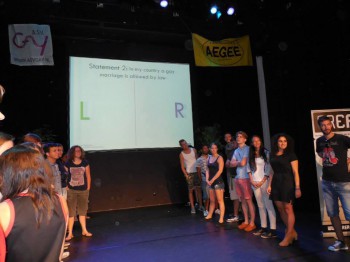
We can definitely say that they gained a lot of experience in many ways. Our SU was set up as a game throughout the two weeks. Our twenty-five participants were divided in five teams. Each day there were challenges where they could earn points. On the last day it all came down to one thing, win the ultimate challenge! This was a mixture of different games, such as the debating competition, yoghurt rugby and beer soccer.
For many of the participants the main highlight of this SU was the spectacular gay pride on the canals. Besides this festive day, we also had a more serious movie and debating night concerning transgenders. With the help of a local gay student association and two guest speakers we showed the participants what the situation is like is for LGBTs in The Netherlands and compared it to their own country. It’s shocking to see that countries so close to each other can seem to be worlds apart concerning this subject.
I think a striking example of the differences between The Netherlands and a lot of other European is the following; One male participant from Hungary told us that he has had a boyfriend for over two years already. In fact his anniversary date was during the SU. Because of this I naturally – for someone from The Netherlands – supposed that he was openly gay, but quite the contrary was the case. Instead of being able to fully be himself, like he was during his time in Amsterdam, almost no one except for his parents and his closest friends knew he was gay. And at home it wasn’t normal for him to talk about it with his parents.
We ended the two weeks with the policy officer of social inclusion, Eline de Graaf. Eline has been very active on the subject of LGBT rights and has done research within AEGEE via questionnaires that she sent to all the locals. These questionnaires contained questions examining the opinion of AEGEE members towards LGBT rights. She gave a presentation about her research and showed us her research results of gay acceptance within AEGEE-Europe. These results showed us once more that there is a lot of inequality throughout Europe concerning the acceptance of LGBT people.
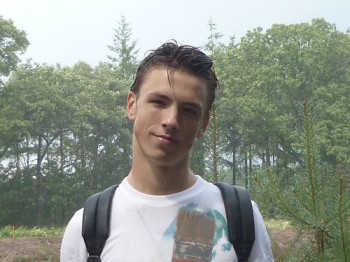
What made these results shocking, at least for me on a personal level, was that such inequality even exists within a student network that is seemingly so progressive and is so active in the field of human rights. With the feeling that in the last years there has been a lot of progress on this topic, we also felt that there is still a lot to work on and we believe that AEGEE can play a big part in this. With a network as big as AEGEE-Europe’s we are able to reach a lot of people, and I feel that it is much needed to open the debate about LGBT acceptance within AEGEE.
At the moment there is not even a working group on this subject. In Eline’s experience the reason for this is that people fear for the negative consequences it might have for them if they were to become a member of such a group. As a student organization that strives for a unified Europe where everyone can live their lives as he or she pleases, it would be a good thing of we would devout more attention to a subject that concerns so many of us and is an essential part of human rights. Therefore I think it is great that Eline helps generating attention for this subject with her research and presentations of the results and I am proud to be a member of the first AEGEE local ever to have organized a Summer University around LGBT rights!”
Here you can read the experiences of some participants.
Why did you choose the Summer University of AEGEE-Amsterdam?
I choose it because it was the only SU that promoted the LGTB rights and as a gay person I’m worried about this topic. Besides, I wanted to visit the beautiful city of Amsterdam.
What is the situation for LGBTs like in your country?
My country has a very developed legislation about supporting LGTB rights, but it always can improve and we have a long way to the total equality and normalization.
What was your favourite aspect or activity of the SU?
The gay parade and the clip-paper game!
Did the event change your perspective on LGBT people, and if so, how?
Like a LGTB person this SU has made me feel more comfortable with myself and made me more conscious about my situation and how I must fight to reach the total normalization of LGTB people
What was visiting the gay pride parade like?
It was awesome and I hope the next time I’ll be on one of those boats!
Why did you choose the Summer University of AEGEE-Amsterdam?
I’ve chosen the Amsterdam SU, because I thought that really progressive people are going to participate.
What is the situation for LGBTs like in your country?
In Ukraine people are really homophobic. They think that gayness is a kind of illness, which is dangerous for society. Actually people don’t know who LGBT exactly are.
What was your favourite aspect or activity of the SU?
All the people I met in Amsterdam were really friendly, kind and open to me, that’s why I felt really comfortable and free. These people changed me and the way I understand the world a lot.
Did the event change your perspective on LGBT people, and if so, how?
I was tolerant to LGBT people before and I am now. I met lots of gay people in Amsterdam. They are my friends now and I feel I should fight against homophobia in my country
What was visiting the gay pride parade like?
It was like a carnaval, I had a lot of fun
Why did you choose the Summer University of AEGEE-Amsterdam?
The strongest attraction in favor of Amsterdam was the message “Expand your boundaries”. Being gay is not very well accepted in Hungary, and I was very curious what is was like in the Netherlands, and I wanted to feel that it is a completely normal thing and that it does not have to define you. I mean, yeah, it is important, but it is not like that, when people get to know this fact and look stunned, and no further questions are asked.
What is the situation for LGBTs like in your country?
I would not say it is too bad. You can be gay if you want, there is less and less violence against gay people. Well, you can not kiss on the street, and every now and then there are protests, but those are very right wing people. And of course we would never see a governor’s greetings in a gay newspaper. I would say it is accepted, as long as you are not talking about it. Budapest has a quite big gay community, the biggest in Central and Eastern Europe. Foreigners come here to parties.
What was your favourite aspect or activity of the SU?
My favourite was the movie night and hearing a transvestite talking. To tell the truth it was hard for me to accept a few of her points of views, but it was very interesting to hear that.
Did the event change your perspective on LGBT people, and if so, how?
I would not say it changed my views, maybe because I haven’t been really active in the LGBT community in Budapest, and I already accept them – well, as I am one of them.
What was visiting the gay pride parade like?
It was my second pride to participate in, the first one was in America – ten years ago. It was very special. Almost everybody of the city was there, families with children, old people, young people, regardless of being gay or not. It was a big festival to have fun. I felt it was not really about a demonstration of the gay community, just a fun day for all. I wish prides in Budapest were like that. And I had a great time.
Related Posts
1st August 2019
The Gallery of All Presidents of AEGEE-Europe
Here is the gallery of all Presidents of AEGEE-Europe - with photos of every one of them. Enjoy the list!

